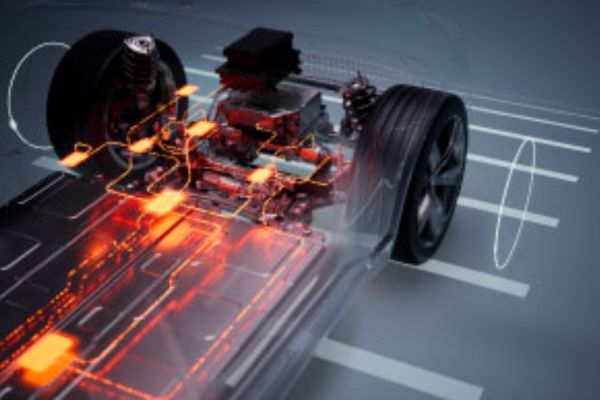STMicroelectronics , a global semiconductor leader serving customers across the spectrum of electronics applications, has announced Stellar with xMemory, a new generation of extensible memory embedded into its Stellar series of automotive microcontrollers, that transforms the challenging process of developing software-defined vehicles (SDV) and evolving platforms for electrification.
Instead of managing multiple devices with varying memory options and the associated development and qualification costs, Stellar with xMemory introduces a single, innovative device with extensible memory, providing customers with an efficient and cost-effective solution. This simpler approach from the start enables carmakers to future-proof their designs, with room for additional innovation later in their development cycle, reducing development costs and accelerating time to market with a simpler supply chain. Stellar with xMemory will be first available on the Stellar P6 MCUs, which target the new drivetrain trends and architectures for electric vehicles (EVs), with production to start later in 2025.
“ST has developed the ultimate memory technology for the automobile market with the smallest bit cell to meet the endless need for more memory. Stellar with xMemory will streamline the car architectures of tomorrow, making them more cost-effective and significantly reduce development time for carmakers,” said Luca Rodeschini, Group Vice President and General Purpose and Automotive Microcontrollers Division General Manager, STMicroelectronics. “This innovative solution enables the same hardware to ensure carmakers have the infrastructure and capabilities with the headroom to continuously innovate their products over time. It provides peace of mind to introduce new innovations in digitalization and electrification, allowing them to stay ahead in the market and extend the lifetime of their vehicles.”
“With the embedded Phase Change Memory (PCM) technology, Stellar offers a robust and flexible memory concept to create highly performant, adaptable microcontrollers for automotive usage. The technology provides application advantages compared to other memory technologies, such as RRAM and MRAM,” said Axel Aue, Vice President, Bosch.
“By choosing an extensible MCU like Stellar with xMemory, engineers can avoid costly hardware redesigns to support software features. As software inevitably grows, whether during the initial development or through post-launch OTA updates, the same platform can be upgraded in the field, significantly reducing time-to-market and maintenance costs. A solution like Stellar with xMemory also enables simplified logistics and bill of material efficiency,” said Anshel Sag, Principal Analyst, Moor Insights & Strategy.
How it works
Carmakers need seamless integration of software and hardware to maximize reuse across platforms, extend vehicle longevity and enhance digital capabilities. Memory becomes a bottleneck as software complexity grows, driven by new features and regulations, memory-hungry AI and Machine Learning applications, and over-the-air (OTA) updates. ST’s xMemory addresses this challenge by extending the memory either during the development phase or when vehicle is in the field, giving them unlimited application upgrades.
Selecting the right MCU at the start of the SDV lifecycle ensures sufficient on-chip memory for future software development. Today’s choice of over-specifying memory increases costs, while under-specifying may necessitate finding and re-qualifying a different MCU with extra memory later, adding complexity, cost, and delays. Stellar MCUs with xMemory are competitively priced to bring additional savings, simplify the OEM supply chain, and accelerate time to market by lengthening the product lifetime and maximizing reuse across projects to reduce time for qualification.
Technical notes for editors on PCM and Stellar:
ST has been at the forefront of the transition from Flash to eNVM technology in automotive MCUs, introducing the first 28nm eNVM qualified for automotive applications, which is at the core of the xMemory. ST’s embedded Phase-Change Memory (ePCM) has the best power, performance, area (PPA) index of NVM technologies such as RRAM, MRAM, and Flash.
With the industry’s smallest eNVM cell size, PCM fabricated at 18nm and 28nm nodes provides twice the memory density of other technologies.
The latest-generation PCM technology will be available on all upcoming Arm-based Stellar P and G automotive MCUs. The Stellar family is dedicated to automotive applications and simplifies vehicle electrical architectures for increased power, flexibility, and safety. The portfolio includes Stellar Integration MCUs (Stellar P and Stellar G series) for centralized zone and domain controllers and body applications, which consolidate the functions of multiple, separate communication and control ECUs, and Stellar Electrification MCUs (Stellar E series), which are optimized for control of EV traction-module power converters.













